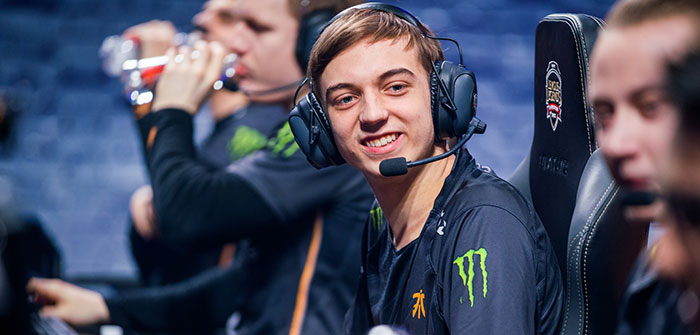Rasmus “Caps” Winther grew under the wing of legendary teammates sOAZ and Rekkles and has now blossomed into a talent that will try to live up to the reputation of EU mids.
JANUARY 2013. KATOWICE, POLAND. A 55-minute game between Fnatic and SK Gaming is finally drawing to its conclusion. After a couple chaotic fights, Fnatic mid laner xPeke teleports into the SK base after a lost team fight with a sliver of life to his name. His Kassadin is immediately met by SK gaming top laner Kev1n’s Olaf. Axes are flung across the Nexus as Kassadin Rift Walks from one side to the other. Slowly the Nexus’ health is chipped down. The crowd steadily grows louder. The casters start to realize it’s not a suicidal play — their initial confusion as to why xPeke is there dissipates as they, too, start to believe. The play only takes 20 seconds. The Nexus falls. And like that xPeke is immortalized in the League of Legends pantheon.
It is, to me, one of the rare moments in our sport where the player transcends the game. When I think of this play, I don’t think of Kassadin hitting the Nexus. I picture xPeke himself on the Rift. I think of SK mid laner Ocelot (now G2 owner) crying into his scarf. I think of FNC top laner sOAZ crying moments later. This play is the pinnacle of an era where European mids dominated the League of Legends conversation — it happens just before Faker erupts onto the scene to redefine everything we know. But in that era, names like Alex Ich and Froggen inspired millions of players to take up the mantle in mid lane. I was one of them. And likewise, G2’s current mid laner Perkz watched them. And FNC’s current mid laner Caps too.
The tradition of Europe producing star mid laners continues to this day — the NA LCS alone hosts four of them. Alongside Perkz and Caps, there are rising stars like Vitality’s Jiizuke in the EU LCS. In the same way that millions of children practice dribbling thanks to the acrobatics of Lionel Messi, LoL players in EU tried and continue to try to emulate the heroics displayed by the likes of xPeke.
Caps would turn 14 later that year and then hit Challenger for the first time. It’d be a few years yet before he became eligible to join the EU LCS. But already the initial stirrings of something greater began to inhabit him. Despite successes, the region has lost some of its luster in recent years as the stars of old retired.
Part of that is tied to the appearance of Faker in Korea — how could EU’s mids be lauded if the best in the world resided elsewhere? Faker’s existence has, at least in part, denied EU their biggest advantage at every single international tournament until now. Suddenly mid laners were chasing Faker. Not xPeke or Froggen or Alex or Ocelot.
This has given the whole region a “chip on the shoulder” kind of mentality where they feel slighted by everyone else. And maybe they are actually slighted. I’ll admit most of my love for EU is rooted in nostalgia more than what they are now. Teams then had swagger. Rivalries were intense — it felt like they actually disliked each other. Like, M5 and Ocelote felt like rival mafia bosses. Froggen was a lynchpin in his own right, and Fnatic’s squad felt like the villages loveable troublemakers. I craved all of it. And slowly, that edge is returning.
Now, as a major international tournament returns to Europe for the first time since 2015 where two EU teams made the Semifinals with two prominent mid laners. The chance to rise and truly become a superstar is well within grasp. If Caps can carry his team to an MSI championship, then he can reignite the region’s passion.
“
"I ALWAYS FELT LIKE I WAS SECOND BEHIND PERKZ. AND I DIDN’T KNOW HOW TO GET ABOVE HIM."
He has already conquered his first wall. He says, “[When] I joined the LCS, I was really confident, but I had a lot of respect for Perkz. I feel like that hindered my abilities — last year, I felt like I was always in the shadow of Perkz. Even when people were saying I was 5th [best mid in EU], I always felt like I was second — but [still definitely] behind Perkz. And I didn’t know how to get above him.”
But Caps continued to persevere. Even after starting 0-4 at Worlds last year, Fnatic managed to rally and secure a birth in the Quarterfinals thanks to a miraculous run. In a lot of ways, I wonder if that ultimately will be looked at as the catalyst that jump started his career. It steeled him for this year if nothing else.
He says, “I want to [surpass] not just the EU mid laners, but all the mid laners in the world. I just looked at what [Perkz] does and said, ‘Why am I respecting this guy so much? Why is he unbeatable to me? Why am I always losing to his team?’ And I realized I have no reason.”

CAPS TAKES THIS MINDSET NOW TO MSI after a dominant split from Fnatic saw them end G2’s two-year reign atop the EU LCS. It seems fitting for them to return to the top just as a major event returns to the region. sOAZ is a sort of living legend at this point and always seems to perform well internationally. FNC ADC Rekkles is the face of the region. But Fnatic was alwaysat its most potent when a strong mid laner demanded the spotlight. And Caps may yet surpass them all — it is, after all, Europe’s mid lane that captures the rest of the world’s attention.
And Caps understands this pressure that’s placed on his shoulders. He knows that it’s normally Rekkles who shoulders the burden for the team, but this year’s MSI features the top ADCs from Korea’s LCK, China’s LPL, and the NA LCS in PraY, Uzi, and Doublelift, respectively. Rekkles will have his hands tied just matching them. And FNC should expect rookie top laner Bwipo to struggle a bit as he adjusts to the cadence of international play. That means Caps must excel if his team hopes to do Europe proud.
Even against the Korean juggernaut that is KING-ZONE DragonX — a roster that features a Top 3 player [in the world] at each position — Caps is unfazed. He’s aware they haven’t dropped a single set this split that Khan has finished.
“On paper, they are really scary,” he admits. “[But] I imagine a lot of it also comes from even the Korean players maybe respecting them too much. I can see [teams] being afraid of them and thinking, ‘Oh, they’re just going to win.’
“A lot of EU teams look at Worlds,” he continues, “They try their hardest to win EU and go to Worlds, but when they’re actually at Worlds and face Korean teams… I don’t want to say they don’t care, but they already see themselves as losing. And they’re fine with losing. Because they’re like, ‘Oh yeah, they’re Korean so [of course] we lost to them. But I, and the rest of the team, aren’t fine with losing. We will always strive to beat them.”
To say that and to enact it are two different things entirely. Caps experienced first hand just how deadly KZ is when he faced Longzhu and the bulk of their roster last year at Worlds. It’s one thing to say you won’t let your opponent’s reputation overwhelm you, but it’s another thing to actually imbue that into your very being. When you string together a missed cannon minion or get ganked or your team loses a game, is it actually possible to not lean back and think, “Maybe the Koreans are just better after all.”
As a fan, I know that sinking feeling. That inevitable droop as you realize your team is slower and outclassed. This is something you see across all the major sports. Of course the Raptors lost. Of course the Warriors won. But always — Goliath falls. Usually, it’s a different super power that takes over. But sometimes it’s an upstart. Sometimes the dark horse rears its head and surges to the front of the pack. And what is Fnatic this year but a dark horse?
As a region, Europe’s success against Korean teams has been fleeting — especially in recent years — but it’s not like blueprints don’t exist. Lightning-fast aggression from the likes of Moscow5 knocked out Korean squads before they could even respond. Or on the other end of the playstyle spectrum, CLG.EU’s slow and methodical pace strangled their opponents. EU has excelled when they’ve played their own styles. And if Fnatic can step firmly into their own identity, then they’ll be an exceptionally dangerous opponent.
Caps sits in a field of mid laners who are all renowned in their own right. But none of them have truly risen above the pack. In the world of mids right now, it’s Faker at the top and then a hungry pack of challengers below him. If Caps can rise above the likes of BDD, Maple, and Xiaohu here, then he can stake claim to being among the world’s best.
Perhaps Caps can shed his “Baby Faker” moniker for good — this could be the major shift the region has desperately wanted for years. Players like Febiven and PowerOfEvil have stood eye-to-eye with Faker. It was, at times, enough to make you believe in the strength of EU’s mids. In so many ways, they’ve been forced to chase his shadow. But he’s not here this time. Caps can lead the charge into new light and remind the world that original carry mid laners came first from Europe.
“Joining Fnatic, I always wanted to win Worlds,” he says. “It was one of the first things I said. And then we had the Spring Split [in 2017] where it didn’t go well and a lot of people said I had to focus on EU first before moving up. And, well, we won EU now.”
MSI is the year’s first major stepping stone towards Worlds. It’s a chance for teams to gauge the sharpness of their blades. In a land steeped with regional pride, Caps and Fnatic will try to write a new chapter for the EU LCS. The charge will be led by their young mid laner — the stage is set for him to take.
